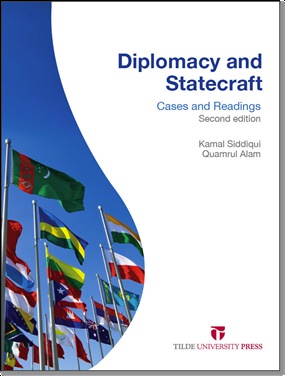Quite recently, in an important address to the United Nations General Assembly, under the title “From Turmoil to Peace”, Secretary-General Ban Ki-moon asserted before the highest representatives of 193 member states that diplomacy is on the defensive, undermined by those who believe in violence. In his opinion, diversity is under assault by extremists who insist that their way is the only way, while disarmament is viewed as a distant dream, sabotaged by profiteers of perpetual warfare. He demanded leadership and solidarity for securing peace and justice in our world.
It is from this humanistic perspective that we should welcome the publication of the third edition of the book Diplomacy and Statecraft by Dr. Kamal Siddiqui. As a respected diplomat, scholar and professor from Bangladesh, Dr. Kamal Siddiqui is well-placed to reflect on the ways in which various authors approach diplomacy and interpret diplomatic events during the current irreversible process of globalization.

Dr. Kamal Siddiqui’s book is a comprehensive work containing 12 chapters and covering 418 pages. The book starts with several definitions of diplomacy and its uses. In accordance with one such definition, diplomacy is the management of relations (e.g. political, security, military, economic, scientific and cultural) between states, as well as between states and other international actors such as global/regional organizations, international non-governmental organizations and transnational corporations by negotiation.
Diplomacy is also an art demanding tact and skilful negotiation to improve relationships and build mutual respect at the bilateral, multilateral and global levels. If correctly and professionally practiced, it is able to lead to successful outcomes illustrated by win-win situations for all partners. It is also clearly explained that while diplomacy and foreign policy are closely related, they are not synonymous, as diplomacy is just one of the instruments for implementing foreign policy. In the same context, it is reminded that statecraft can be defined as the art of preserving and strengthening the state in its relations to other states and international organizations.
The final chapter is dedicated to diplomacy in Islam.
While providing fresh and interesting insights into the diplomatic world, the author has inserted in his volume 16 recent case-studies. This approach is very useful, as it facilitates a better understanding of practical aspects of diplomacy by students of international relations. The legal foundations of diplomacy are well summarized in the book by relevant references to the functions and status of diplomats which are governed by the 1961 Vienna Convention on Diplomatic Relations which is the main universal legal instrument in the field, being ratified until 2014 by 190 states.
While focusing mostly on the diplomatic practice of the major powers with particular emphasis on Western diplomacy, this book has also the merit of offering a persuasive picture of the specificity of diplomacy conducted by developing countries. It is critically noted inter alia that, “In many developing countries, the classical functions of diplomacy are not performed at all, or are impaired since the functionaries staffing the resident missions are to a large extent not professional diplomats.” (p.143)
Dr. Kamal Siddiqui emphasizes that developing countries need the protection of international law, especially when they have no other forms of defense against external exploitation and intervention. (p.252)
As negotiation is the first function of diplomacy, the author pays a lot of attention to the desirable personal qualities of a practical negotiator. These qualities are: empathy, integrity, patience, self-assurance, ingenuity, trust and credibility, stamina, the ability to be friendly, being an achiever but not being aggressive, and having a clear understanding of the issues at stake. (p.193)
The book contains remarkable considerations about multilateral diplomacy and multilateralism. Indeed, multilateral diplomacy is more instrumental, is based on universal values and principles, embodies greater coordination and provides a higher legitimacy to international cooperation. The European Union and ASEAN are described as successful examples of multilateral diplomacy.
Multilateralism is in a process of evolution, as it involves today not only states, but also many non-state actors, such as non-governmental organizations, chambers of commerce and industry, regional bodies, provincial governments, local government organizations and professional experts. (p.390)
The author rightly reminds that diplomacy is a perennial institution characterized both by continuity and change, as well as by improvement and deterioration. Diplomacy assumes greater importance with the progress of globalization and its scope will further widen and deepen, as globalization generates new challenges and conflicting issues.
Globalization will profoundly affect the very nature and agenda of diplomacy. (p.392) Diplomacy must fortify its role in world affairs and should avoid and combat an increasing amateurism, visible today in many confrontational situations which demand genuine professionalism in order to reach lasting solutions.
The next edition of this valuable book could be supplemented with a diplomatic analysis of the six fundamental values proclaimed in the United Nations Millennium Declaration of September 8, 2000. These values are: freedom, equality, solidarity, tolerance, respect for nature and shared responsibility. They are essential for the international relations during the 21st century. In this regard, it is appropriate to remind the topicality and the relevance of an assertion formulated by Mahatma Gandhi, leader of the Indian independence movement and pioneer of the philosophy and strategy of non-violence. He said, “Your beliefs become your thoughts. Your thoughts become your words. Your words become your actions. Your actions become your habits. Your habits become your values. Your values become your destiny.”
Dr. Kamal Siddiqui’s volume can be recommended for study and consultation to students, professors, policy makers, diplomats, journalists and to all persons interested in world affairs. It is axiomatic that constructive diplomacy operates through permanent advocacy which requires an adequate educational approach to this field, in which specialized books deserve a good place.
Note: Dr. Ioan Voicu is a visiting professor at Assumption University of Thailand, Bangkok. The book reviewed above Diplomacy and Statecraft by Dr. Kamal Siddiqui can be ordered from Academic Press and Publishers Library, Dhaka-1209, Bangladesh, at [email protected]




